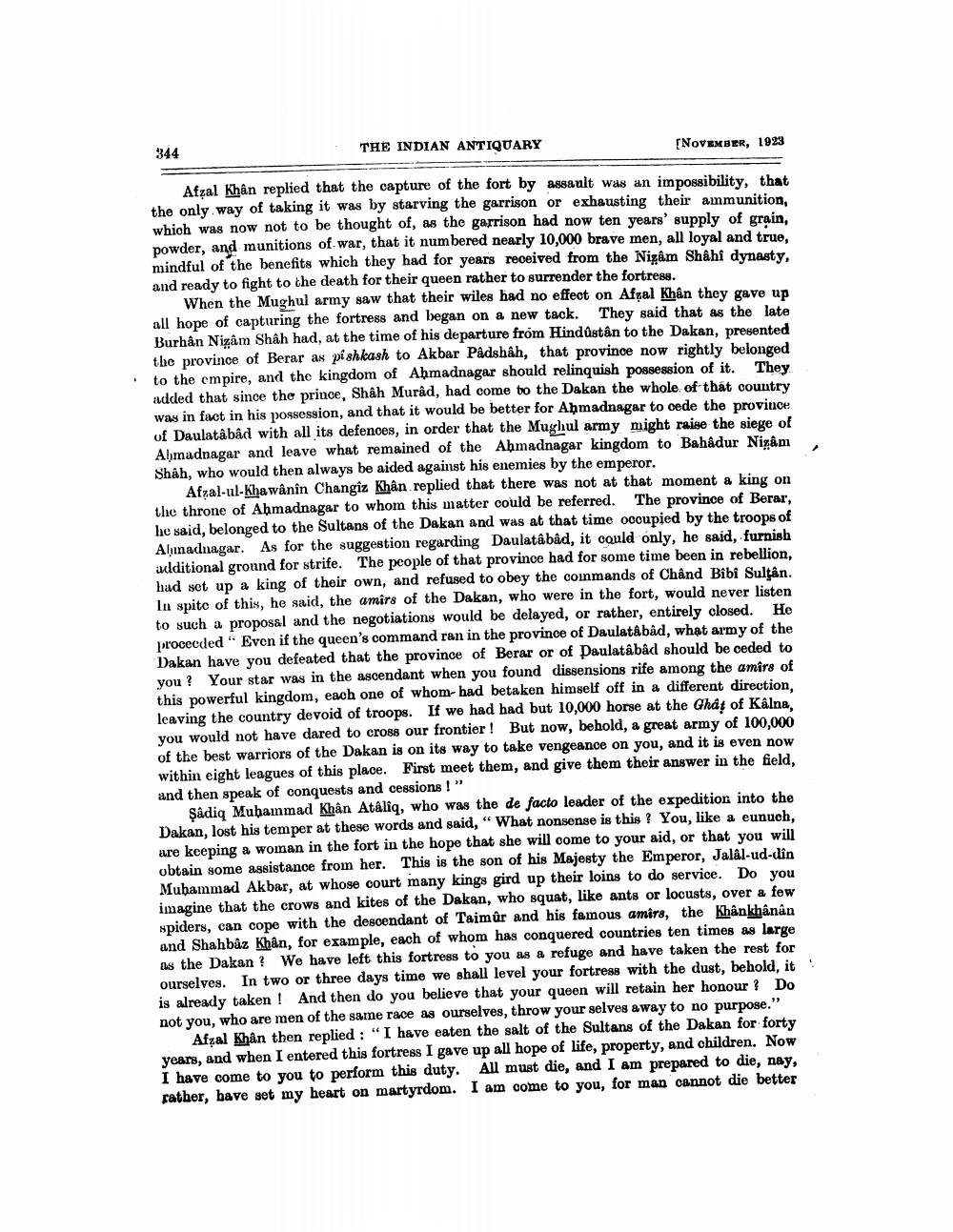________________
344
THE INDIAN ANTIQUARY
[NOVEMBER, 1923
Afzal Khân replied that the capture of the fort by assault was an impossibility, that the only way of taking it was by starving the garrison or exhausting their ammunition, which was now not to be thought of, as the garrison had now ten years' supply of grain, powder, and munitions of war, that it numbered nearly 10,000 brave men, all loyal and true, mindful of the benefits which they had for years received from the Nizâm Shâhi dynasty, and ready to fight to the death for their queen rather to surrender the fortress.
When the Mughul army saw that their wiles had no effect on Afyal Khân they gave up all hope of capturing the fortress and began on a new tack. They said that as the late Burhan Nizam Shah had, at the time of his departure from Hindústân to the Dakan, presented the province of Berar as pi shkash to Akbar Pådshah, that province now rightly belonged to the empire, and the kingdom of Ahmadnagar should relinquish possession of it. They added that since the prince, Shah Murad, had come to the Dakan the whole of that country was in fact in his possession, and that it would be better for Aḥmadnagar to cede the province of Daulatâbâd with all its defences, in order that the Mughul army might raise the siege of Ahmadnagar and leave what remained of the Ahmadnagar kingdom to Bahadur Nizâm Shâh, who would then always be aided against his enemies by the emperor.
Afzal-ul-Khawânîn Changiz Khân replied that there was not at that moment a king on the throne of Ahmadnagar to whom this matter could be referred. The province of Berar, he said, belonged to the Sultans of the Dakan and was at that time occupied by the troops of Ahnadnagar. As for the suggestion regarding Daulatâbâd, it could only, he said, furnish additional ground for strife. The people of that province had for some time been in rebellion, had set up a king of their own, and refused to obey the coinmands of Chând Bibi Sultân. In spite of this, he said, the amirs of the Dakan, who were in the fort, would never listen to such a proposal and the negotiations would be delayed, or rather, entirely closed. He proceeded "Even if the queen's command ran in the province of Daulatâbâd, what army of the Dakan have you defeated that the province of Berar or of Daulatâbâd should be ceded to you? Your star was in the ascendant when you found dissensions rife among the amirs of this powerful kingdom, each one of whom had betaken himself off in a different direction, leaving the country devoid of troops. If we had had but 10,000 horse at the Ghat of Kálna. you would not have dared to cross our frontier! But now, behold, a great army of 100,000 of the best warriors of the Dakan is on its way to take vengeance on you, and it is even now within eight leagues of this place. First meet them, and give them their answer in the field, and then speak of conquests and cessions !"
Sadiq Muhammad Khan Ataliq, who was the de facto leader of the expedition into the Dakan, lost his temper at these words and said, “What nonsense is this? You, like a eunuch, are keeping a woman in the fort in the hope that she will come to your aid, or that you will obtain some assistanoe from her. This is the son of his Majesty the Emperor, Jalal-ud-dîn Muhammad Akbar, at whose court many kings gird up their loins to do service. Do you imagine that the crows and kites of the Dakan, who squat, like ants or locusts, over a few spiders, can cope with the descendant of Taimûr and his famous amirs, the Khânkhânân and Shahbaz Khân, for example, each of whom has conquered countries ten times as large as the Dakan? We have left this fortress to you as a refuge and have taken the rest for ourselves. In two or three days time we shall level your fortress with the dust, behold, it! is already taken! And then do you believe that your queen will retain her honour ? Do not you, who are men of the same race as ourselves, throw your selves away to no purpose."
Afzal Khan then replied: "I have eaten the salt of the Sultans of the Dakan for forty years, and when I entered this fortress I gave up all hope of life, property, and children. Now I have come to you to perform this duty. All must die, and I am prepared to die, nay, rather, have set my heart on martyrdom. I am come to you, for man cannot die better




